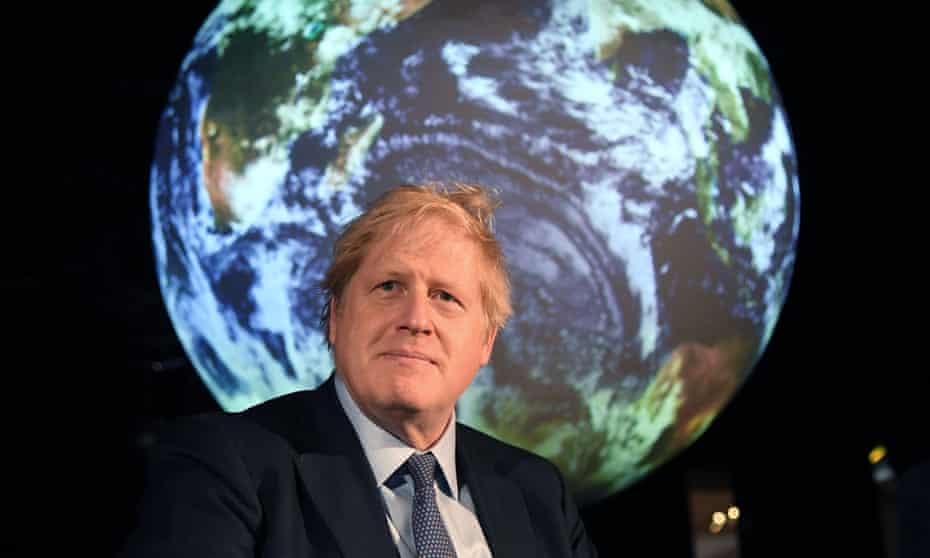The host of Cop26 needs to be a master of diplomacy. Unfortunately, it’s Boris Johnson


The Queen is not amused. “We only know about people who are not coming,” the monarch was overheard saying. “It is very irritating when they talk, but they don’t do.”
It is not the turnout for a Buck House party that is exasperating her, but the unanswered invitations to the Cop26 climate summit that will meet in Glasgow in November. With just a fortnight to go, it is still not clear whether the leaders of China, India or Russia will even turn up, never mind agree to do anything meaningful to address the climate crisis.
There is still just about time for one or more of them to send in a last-gasp RSVP, but their reluctance to engage is one of many anxieties for a host who has previously raised expectations that this summit will be a world-saving triumph. When Boris Johnson addressed the UN general assembly in September, he exported to the global stage the boosterism that is so familiar to his domestic audience. From the UN podium in New York, he declared that Cop26 would be “the turning point for humanity“.
That sounded like hyperbole unanchored from reality even as he said it. Someone with a better grasp of the geopolitics of the climate crisis and its fiendishly complex challenges would have used more tempered language. For many people, Cop26 is already doomed to let down the planet because no one ever had any serious expectation that this summit would agree to targets for cutting carbon emissions that are robust enough to prevent destructive levels of global warming. The more limited, but nevertheless critical, ambition for this gathering is to extract promises that would get the world closer to being on track to containing global warming to no more than 1.5C above pre-industrial levels. That was the goal set in the groundbreaking Paris climate deal in 2015.
In the run-up to the Glasgow summit, we have been told by Mr Johnson that the climate crisis is his number one priority. It is moot how much he is sincerely animated by the fate of the planet. In a previous incarnation as a rightwing newspaper columnist, he was noisily sceptical about the existence of climate change and ridiculed wind power as too feeble to knock the skin off a rice pudding. But in his own self-interest, if nothing else, he needs this summit to be seen as a success. Here is an opportunity to demonstrate that Brexit Britain has the capacity to provide international leadership on the most severe threat to the planet.
Success has always been contingent on Mr Johnson getting several things right. Britain’s credibility as the host and ability to persuade others to change their behaviour depended on this country being an exemplar. Yet the government’s full plan to show how Britain will reach net zero by 2050 has still not been published. That’s because there are ferocious rows within government about how to finance it and whether voters will tolerate the ways in which they will have to change their lives. As we reveal today, the Treasury is highly resistant to the costs of greening the economy.
Britain did the reverse of setting a good example when Liz Truss, now the foreign secretary, recently signed a draft trade deal with Australia that scrubbed out key pledges on climate action. The deep cuts to the international aid budget have undermined the UK’s moral authority with developing countries. The effort to persuade others to wean themselves off fossil fuels hasn’t been helped by decisions to go ahead with new oil and gas production in the North Sea, while not ruling out a new coal plant in Cumbria.
Making a success of this summit demanded a first-class talent for diplomacy. A key role of the host is to charm and cajole other governments to do dramatically better at cutting their output of greenhouse gases. In advance of Glasgow, all countries were expected to set out updated, detailed and stricter plans to reduce emissions. The G20 group of the largest economies is collectively responsible for more than 80% of annual global emissions. Only 11 of the G20 have submitted stronger targets to the UN, with just two weeks to go. China, Russia, Brazil and Australia are among the countries that have not. John Kerry, the US climate envoy, has rather depressingly suggested that the summit will be about finding out “who is doing their fair share and who isn’t”. This raises the spectre that it will be less about agreement-signing than finger-pointing.
Richer countries have acknowledged that, since they bear overwhelming responsibility for global warming, they owe a debt to poorer countries, many of whom will be the worst affected by a fried planet. More than a decade has passed since the wealthy world promised to provide $100bn a year by 2020 to help developing countries alleviate and adapt to climate change. There are still no assurances that this pledge will be fully redeemed.
The mood music within government has turned gloomier in recent days. There is a rising fear that Glasgow will dismally underdeliver, like the previous Cop in Madrid in 2019. In that disastrous event, it will not be fair to assign all the culpability to Mr Johnson and his government. The UK is an upper middling country, not a superpower. London has some influence in the world, but not the clout to force behemoths such as China and the US to sign up to things they don’t want to commit to. Yet a rotten outcome will inevitably reflect badly on Mr Johnson and make his rhetoric about “Global Britain” ring the more hollow.
Failure will also raise questions about whether Britain has made the most of its “convening power” as the host and maximised the use of what international influence it does possess. Experienced officials have long thought that the government has had a halfhearted approach to this summit and draw unflattering contrasts with the successful Paris Cop. That secured an unprecedented agreement because wealthy western countries made an alliance with poorer states to intensify pressure on the large emitters. There has been an absence of this kind of vital coalition-forging in the build up to Glasgow.
The Paris Cop was co-ordinated by one of the heaviest hitters that France could muster. Laurent Fabius was a former foreign minister and prime minister of France. The role demands someone with international name recognition and a phone crammed with the numbers of lots of world leaders. Having tried and failed to recruit David Cameron or William Hague as the showrunner of Cop26, Mr Johnson handed the task to Alok Sharma, one of the more anonymous members of his government. Until quite recently, he did the job part time, combining it with the position of business secretary. This did not convey a real seriousness of intent to other players. In recent days, Mr Sharma has started lecturing the leaders of the world’s largest economies not to treat the gathering as “a photo-op or a talking shop” and warned that “if temperatures continue to rise we will step through a series of one-way doors, the end destination of which is climate catastrophe”. He’s completely right about that, but this outburst of public exhortation suggests a degree of desperation about the progress of the private diplomacy.
Summits are called such because they are supposed to represent international negotiation at its peak level. They do not succeed without intense amounts of application by the leader of the host country. In 2009, the G20 was convened in London amid the convulsions of the financial crisis. Before the event, Gordon Brown crisscrossed the globe on a mission to persuade his counterparts that it was imperative to take big measures to stabilise plunging financial markets. When it was proving difficult to get the 2005 meeting of the G8 in Gleneagles to sign up to international aid agreements, Tony Blair went in search of Gerhard Schroder, the then German chancellor and one of the obstructionists. Finding him in the hotel bar having a nightcap with Vladimir Putin, Mr Blair put Mr Schroder up against a wall until he gave in.
Mr Johnson has poor relations with other European leaders, a cool one with the US president and a distant one with the leaders of China and India. That made it more, not less imperative, that he put in the hard yards of international diplomacy to try to make a success of this summit. Yet there’s scant evidence that he has thrown himself at it with the all-out vigour demanded by the scale of the challenge and now there’s very little time left. If the Cop is a flop, the host will cop a lot of the blame.
